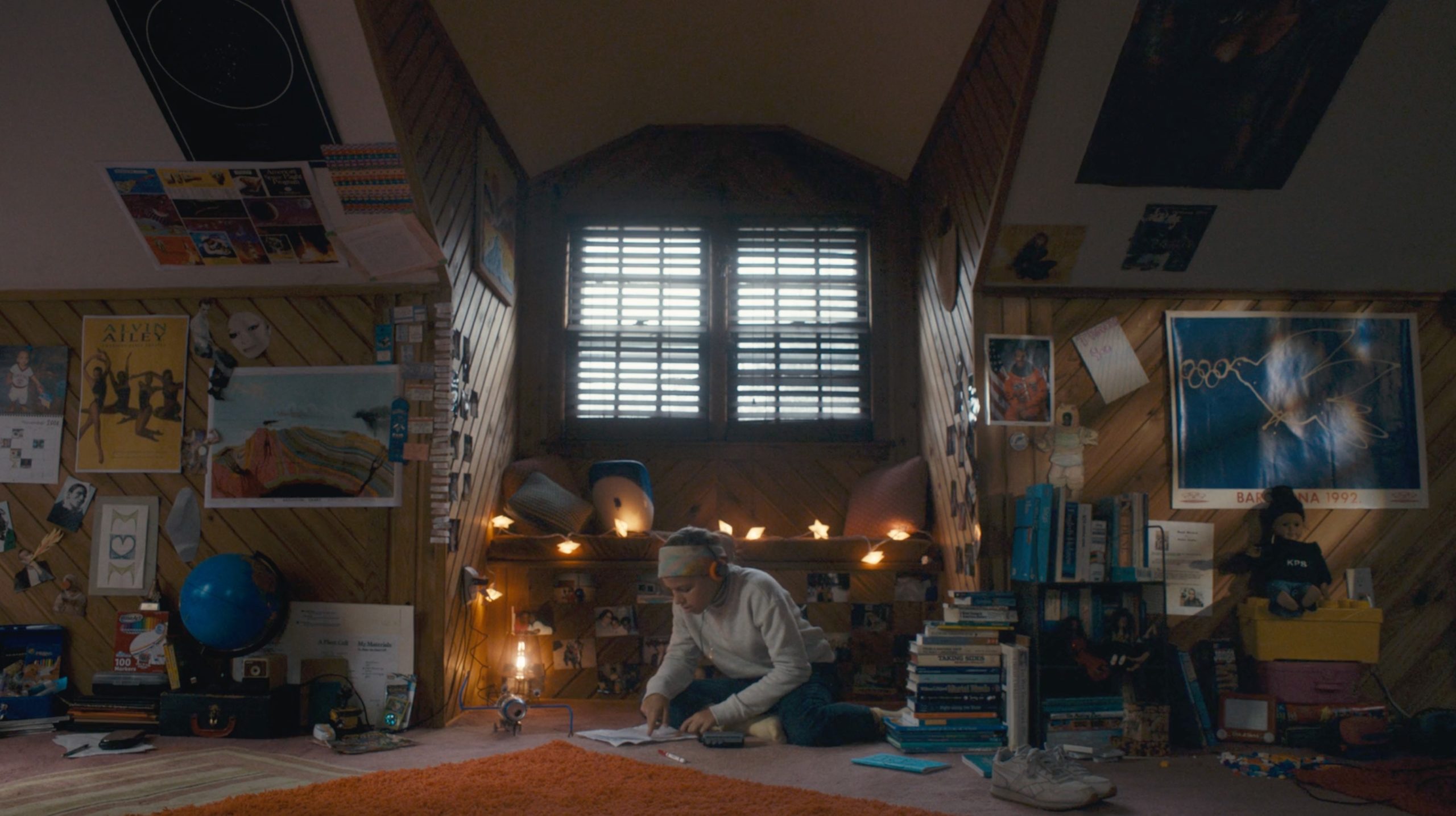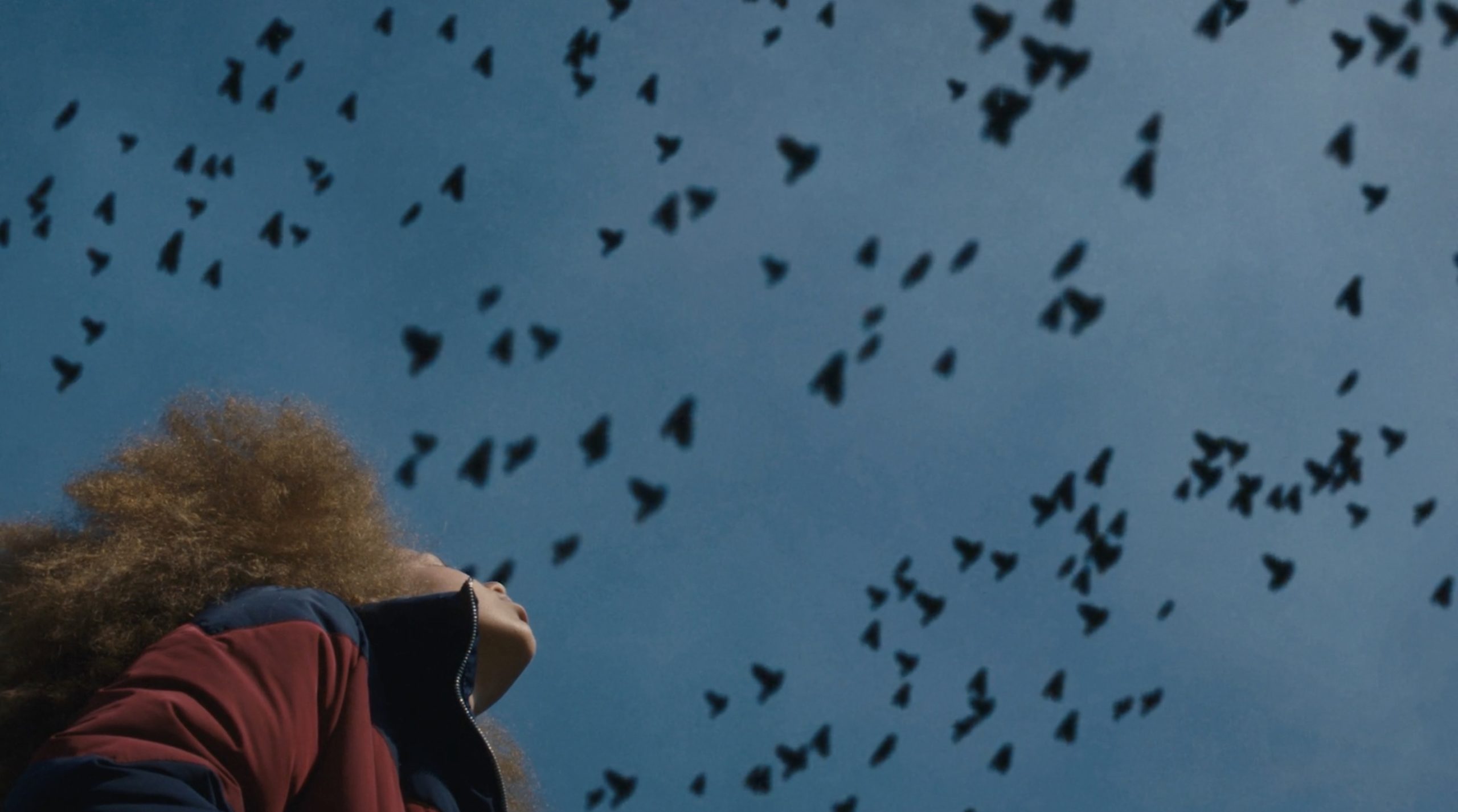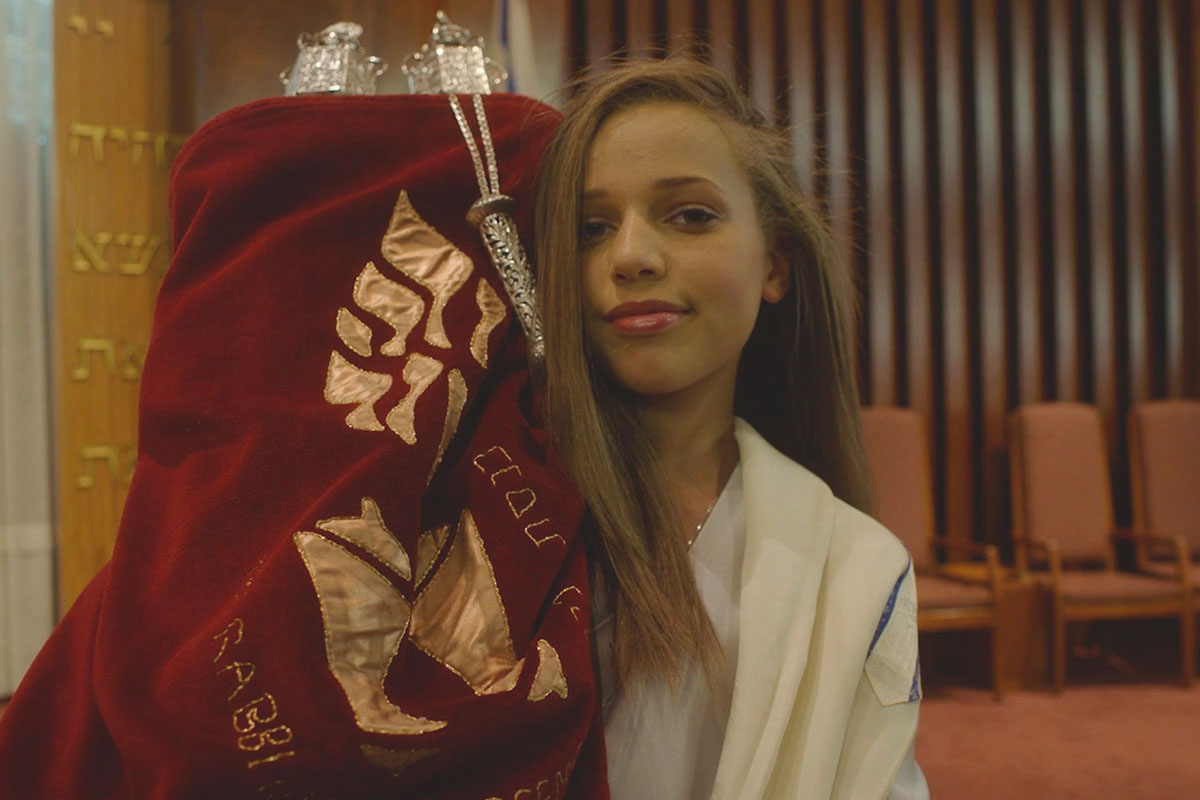Inside an attic ridden with tchotchkes, Birdie, a budding teenager, sits on her knees with a cassette player. She’s listening to a tape of her cantor singing Matot, the Torah portion she’ll read at her bat mitzvah. Click. The music pauses. Echoing the recorded track, the tween chants the ta’amim, the trope for the portion. Ke… ke… She stumbles over a word, and abruptly stops.
This is the first scene in Broken Bird, a film about Birdie, a Black Jewish girl studying for her coming of age ceremony. Heavily drawn from her own experiences, the powerful short is creator Rachel Harrison Gordon’s film debut for SXSW, currently streamable on Mailchimp.
“Matot is about making a vow, keeping a promise,” Gordon tells me in an email interview. “I wanted to celebrate being open to trusting someone, believing that their intentions are good, even if they are unable to live up to it.”

Beyond becoming an adult woman in the Jewish tradition, Broken Bird is about identity, family relations, and adulthood. After Birdie stops singing in the opening scene, snippets of the English translation of the Torah portion flash across the scene: When a man voweth a vow unto the lord… He shall not break his word… He shall do… All that proceedeth out of his mouth.
The man in question? Birdie’s father.
Since her parents’ divorce when she was 4, Gordon was put in a tug-of-war of two identities: one arm was pulled by her white Jewish mother, the other by her non-Jewish African-American father. In Broken Bird, the protagonist dreams of her father attending her bat mitzvah, which he mocks in light jest, singing Hebrew prayers loudly at a Chinese restaurant. Gordon uses Birdie’s hair — she fluctuates between straightening and hiding it — music, and a visitation day with her father to illustrate the tangled web of her complex identity.
Raised in Northern New Jersey, a fairly liberal area, the Jewish filmmaker, 29, tells me she faced a dose of racial microaggressions from her peers and teachers, putting her more at odds with her mixed identity. I spoke with Gordon about her Jewish identity, the symbolism of hair in the film, and the emotional release — and growth — Broken Bird gave her.
You create films that, in your words, question expectations about race, while shining light on intergenerational trauma. Can you tell me about your own generational trauma, and if creating Broken Bird, your first film, was cathartic for you?
We learn a lot about people through the stories other people provide about them, and that colors our impression. I think it’s a brave act to challenge this through exploration. Family stories are basically the first cornerstone for many kids, raised by single parents or otherwise. I learned certain things about my dad from my mom’s side, and even if something wasn’t “wrong,” there was always more to the story; later in life I learned things from my dad’s side that shined light on my mom’s behavior. Making Broken Bird was definitely cathartic — difficult and painful at times, and joyous in the end. The best catharsis has been seeing kids relate to her.
What was your bat mitzvah portion and your party theme (if you had one)?
I believe my portion explained the existence of Yom Kippur. It explored the concept of a “scapegoat,” and included the story of someone literally carrying a goat up a mountain. I think that message is relevant to Broken Bird, the idea of investigating the source of distrust and where blame comes from. My bat mitzvah theme was Harry Potter. I sorted the guests into Houses, which is a potentially problematic thing to do with girls at that age with different friend groups. Wish I could have seen (and filmed!) how people were reacting to that…
Growing up in liberal Northern New Jersey, did you ever face anti-Semitism or racism? I’m reminded of the line in the movie — “Always reminding me, ‘Egypt’s in Africa'” — did this happen to you?
I think there’s an “interesting” form of racism in the community where I grew up. A professor once referred to it as “Northern Racism” – conservative thinking hiding behind a self-appointed liberal title. There’s a stubbornness to people who are proud to be smart, but overlook their own behavior. I have been frustrated that people around me were eager to educate themselves through established sources like podcasts or pieces in the New York Times, evaluating various plights of people, but grew defensive when I expressed myself to them directly, and found my comments challenged or gaslit. It was as if my feelings weren’t legitimate unless they were expressed through a white authority.

People have tried to reach out and bring me into their world throughout my life, and I am happy Broken Bird enables people to jump into mine. That line, “Egypt’s in Africa,” is an example of how people tried to make me feel included, relevant, but ended up confusing me. I didn’t feel connected to Africa. I barely felt connected to family who lived a state away. I was ashamed that my identity and heritage were a mystery to me. It was also a heavy burden to ask me to articulate how slavery compares to the Holocaust, especially with a protective audience. The most hurtful things people did to me were a result of ignorance, not malice: questioning why aspects of my physical appearance, taste, the way I talked, etc. didn’t match their expectations. I was never explicitly bullied, but felt isolated because the people around me had limited exposure to new identities, and told me I was different from how I “should be.”
What does your Jewish identity mean to you now? What does it look like?
Family, food, joy, and laughter. Humor. I think the conflict-laden history of the Jewish people has trained us to process through humor, resiliently pursuing light. I am intrigued by Jewish customs, how they present themselves differently in the United States vs. Israel, and am eager to explore them in film. Being treated as an other made me retreat inside myself and not participate. The fear of becoming a “bad” Jew became a self-fulfilling prophecy. I didn’t pay attention in Hebrew school, I disengaged from Judaism. I hate to see fear or alienation drive behavior, and hope the movie can speak to vulnerable kids out there. On a personal level, developing the movie has helped me re-engage with Jewish culture and traditions – I am eager to re-explore its richness.
How much of this film was based on your real experiences?
A lot. I straddled many lines, and was in a position where I felt I had to choose, in a binary way, who to be. I think that’s a painful process because it involves subduing thoughts and feelings – a lot of processing and growing up. I think I’m having a coming-of-age moment now as I approach 30 because I’m starting to feel comfortable in my own skin, to express myself in a less censored and filtered way.
My parents are also divorced. That feeling of having to ask your parent to show up for you, especially for a ritual that’s foreign to their own culture, is heartbreaking. Talk to me about how your parent’s divorce affected you — if they were separated at the time of your bat mitzvah, what was that like? — and how you’ve overcome those challenges.
My parents got divorced when I was 4. The feeling of someone missing was always present even though I didn’t have any memories of the alternative. I grew up feeling that there was this sense of limited love, that extending positive feelings towards one parent meant harming the other, a zero-sum game. It was hard to build a picture of what “togetherness” could look like because approaching the subject brought up painful feelings for everyone, adversarial.
Humor is a way of overcoming this. If you don’t laugh, you cry.
However, there’s a beautiful outcome of having a variety of impactful people enter your life. I have aunts and uncles and godmothers and nannies who composed my non-traditional nuclear family. Looking back on it, I think there was a desire to be perfect, to not mess anything up. I hear that can be an experience of only children, but also felt by Black women, the pressure to live up to so much, to persevere.
I love all the touches in Birdie’s bedroom, especially the Black Barbie dolls. In an interview I read that most of that tchotchkes were yours — can you talk to me about Jewish and African-American representation and how you feel your parents balanced — or didn’t balance — imparting both cultures on you?
I’m a hoarder! It was hard for me to get rid of things because I had stories attached to them, and now it’s hard because I feel like I might use them in a movie one day. Initially there was a sense that I had to make the parents’ screen time, or their emotional arcs, “equal” in Broken Bird. My parents each contributed to my identity in significant, beautiful ways. They also each left gaps that the other parent couldn’t necessarily fill, that I investigated through the music and stories I consumed. Sometimes that left me empty and still searching. My white mom did the best she could to incorporate Black culture into my life. Birdie’s room has an Alvin Ailey poster, which is an homage to the trips my mom and I took into Manhattan to see the dance troupe’s performance of Revelations. I find the idea of “passing” interesting and challenging. I can’t hide my Blackness, but I have to be proactive about altering people to my Jewishness.
There’s a lot of attention to Birdie’s hair throughout the film. Can you talk about why?
Hair is a symbol that expresses part of our identity, whether we ask for it or not. I realized that people were going to make a judgment or evaluation of how I wore my hair no matter what I did, so I should do whatever I want with it without hesitation. Birdie tests her straight hair out and then puts it in a bun because she doesn’t want attention to it. She doesn’t feel connected to it. She just wants to get by unnoticed, which is a step up from alienated.
Does your own hair play into your identity as an African-American Jewish woman?
I went through a process of processing and straightening my hair to resemble the people identified as pretty: white and blonde with straight long hair. I altered my life around it, around preserving it, steaming it, and torturing it and not participating in activities that would add moisture to it. It dominated me; the idea of others’ beauty controlled my life. My senior year in college I cut off all the processed hair and perhaps that was my own coming-of-age moment like Birdie’s – of choosing to look however I look, regardless of the comments or questions, I didn’t have to give anyone an explanation.
How did you parents react to the film?
I think my dad felt it was cathartic. We now have a great relationship and overcame a tumultuous past. I think he was happy to see our story told poetically and thoughtfully, and to know that I turned out to be a happy, healthy adult who loves him. My mom was funny. My family is a little new to the concept of having a professional artist in the family, and new to seeing versions of work that are rough drafts. I remember my mom reading a scene and exclaiming, “I never said that!” She knows it’s fictionalized but there’s still a gut reaction. They are both very proud.
Header image via Broken Bird. Stream Broken Bird on Mailchimp now.



